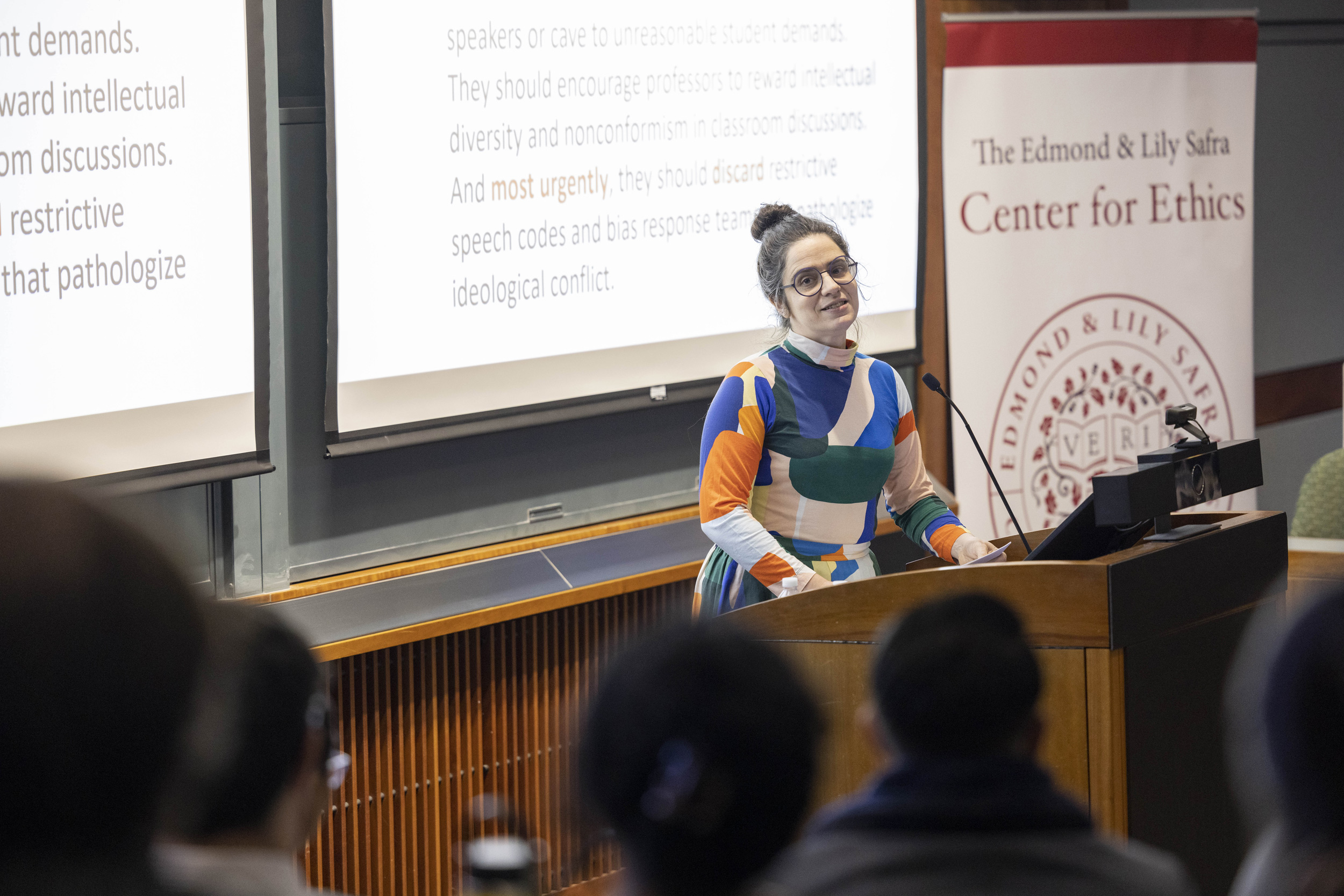
Agnes Callard discussed today’s barriers to more honest and constructive discourse, seeking solutions through Socrates’ political philosophy.
Photo by Scott Eisen
In era of bitter division, what would Socrates do?
Lessons for voters and lawmakers in philosopher’s wisdom, Agnes Callard says: ‘He’s not trying to win. He’s trying to find out.’
Can political discourse survive the culture wars — or is any discussion of the public good doomed to be “canceled” by one side or the other? The philosopher Agnes Callard addressed this dilemma and others, including ideas around free speech, during a lecture Thursday at Harvard’s Edmond & Lily Safra Center for Ethics.
Opening her talk with an examination of the “liberal concept of free speech,” Callard zeroed in on the decision by the science journal Nature to endorse Joe Biden in the 2020 U.S. presidential election. While the journal claimed to be speaking out for science — and for the free and open dissemination of knowledge — the University of Chicago scholar argued that its endorsement was just as likely to sow suspicion, increasing “distrust of science as political.”
One barrier to more honest and constructive discourse, Callard continued, is that voices on the left have adopted the tactics of those on the right. “We bully people without knowing it,” she said. “Not bullying is harder than it appears. And freely defending free speech is harder than it appears.”
As an alternative, Callard offered the clarity of classical philosophy. Distinguishing between persuasion that is coercive and persuasion that teaches or illuminates a subject, she explained how a Socratic argument relies on refutation, which pushes the other person to delve deeper and explain their argument, rather than on simply convincing a passive audience. “Socrates found a way to peel away the symbolism that everyone else feels compelled to layer on a conversation,” said Callard. “He’s not trying to win. He’s trying to find out.”
In its purest sense, Callard said, politics is about how we communally decide to live together, and political argument should focus on how we can best do this, an objective at odds with our current climate of politicization. In the U.S. today, even if a conversation is superficially about immigration or the minimum wage, she said, it’s really “set against the backdrop of a standing conflict,” in which each argument simply signifies a stance in an ideological dispute.
Lamenting how far our discourse has fallen, Callard circled back to arguments that, while apparently defending free speech, may instead undermine it. “Self-politicization itself is the far greater danger because it is an internal obstacle of political speech,” she said. “It restricts communication by shackling itself. So the key idea of Socratic politics is the depoliticization of arguments. If successful, this frees our speech.”
Socrates himself, Callard pointed out, held to these principles even in the face of the ultimate “cancel culture.” Although he was condemned to death for supposed impiety, the philosopher refused to give up his teaching and turned down help that may have saved his life. Holding true to the idea that “the unexamined life is not worth living,” he accepted his fate, said Callard. “An examined life at risk of poverty or death is going to be preferred over an unexamined life of security,” she said.
In the philosopher’s teachings, and even in his death, Callard sees a warning. “There’s something tragic about people who are in a context where they don’t have freedom to inquire, proclaiming their commitment to free speech or free expression or science or truth or nonconformism,” she said. “They may be applauding and speaking out and raising their voices, but they’re not able to mean what they say.”
Following her talk, Callard fielded questions. One participant asked if she saw a “floor” to American political debate. Rather than a floor, she responded, “We need to be thinking of the ceiling. Often having a sense of the ideal — what it is we’re aiming for — can be more useful.”





